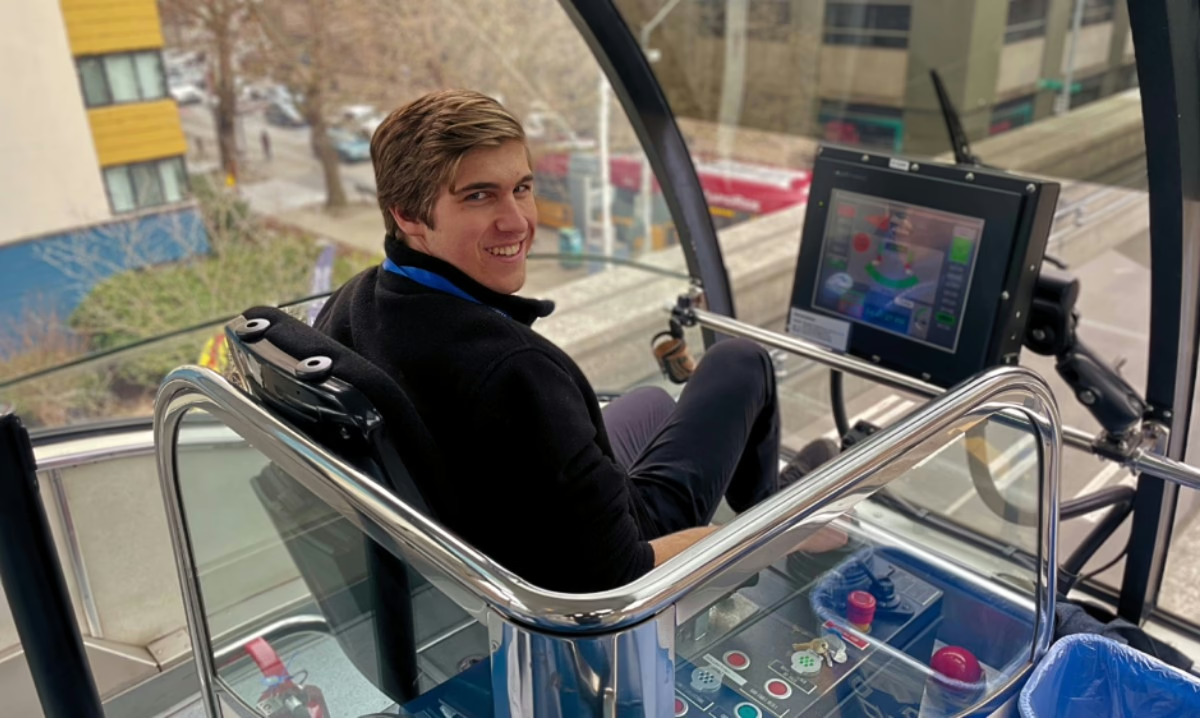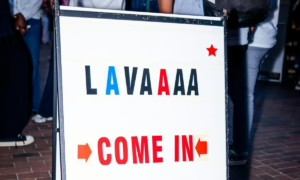At only 18 years-old, Andre Bacon, a Seattle Central student majoring in Computer Science, operates the Seattle Monorail, which runs from Westlake Center to the base of the Space Needle.The structure was built for the 1962 World’s Fair in order to shuttle people from the densely populated downtown area to, at the time, the underdeveloped Seattle Center.
“I started about a month ago. I wanted a part-time job to help me get through school, and I found, ‘Hey, the monorail is hiring?’ So I checked the prerequisites, and I fit them, and I thought I might as well apply … QFC wouldn’t hire me, but this place would, and I’m really glad—this was one of the jobs I really wanted,” shares Bacon.
The monorail has recently seen a lot of use as a legitimate part of the public transportation network in the city, with regular commuters, especially during early morning and late afternoon to evening hours. “The monorail is operated by a private contractor,” states Bacon, referring to the Seattle Monorail Services, which has run the system since 1994.
Bacon says that at first the driving seems easy. The track is slightly less than a mile. But, Bacon adds, “the train definitely runs like it was built in 1962. It ‘s an old system. And secondly, although getting it from one end to the other isn’t too difficult, doing that for several hours a day, consecutively, and getting it perfect every time, is the difficult part.”
The training to be a conductor takes longer than what people might expect, according to Bacon. “You’ll go through about a week’s worth of training for four hours a day. Then afterwards, you have to have a minimum of 48 hours driving with passengers before you’re allowed to drive alone. You also have to pass a test,” he explained, saying that there’s only one monorail certification expert for “all the monorail lines in the entire state.” Bacon’s joke flew over my head until I realized that there’s only one monorail line in Washington.
Andre says that driving the train is a tremendous privilege and a blessing. In terms of his standard job duties, however, Bacon says interacting with people from all over the world is the most rewarding aspect of it. “It is still a lot more tourist-oriented than everything else, so we have a lot of people from different places, and to hear what they think and have those conversations is really rewarding,” he says. “I would single out a story of a family who came here from Germany. … The father was from Germany, but the mother originally lived in Seattle and later emigrated. The couple was quite old, and she told me stories of riding the monorail back when it was first constructed during the World’s Fair.” Bacon adds that talking to people who have seen the changes and progress of the train during their lifespan make for really special moments.
The woman who moved to Germany “remembers it being a lot more relaxed. For most of the monorail’s history, you used to have to purchase a paper ticket from someone who sat in a booth … But now we have fare gates, we have Orca cards, ticket machines, we don’t even take cash anymore … And there are more efficiency-based things,” continues Bacon, “I remember she was describing it as, like, it was a demo. It was a demo show, here’s this new technology, this is how it works, and it was a lot more about the journey than the destination.”
In terms of high ridership, Bacon explains that summer is generally the busiest season. “Summer’s a great time to visit Seattle. It’s also WNBA season, so a lot of people are going to games. Baseball season and cruise ships also start coming into the port. We run extra hours.”
As one of the highest public transportation riderships in the country, Seattle’s public transit increasingly becomes part of the fabric of our lives, concluded Bacon, “Being able to participate in this system that’s been built out over the course of over half a century is fun. It’s fun.”
Bacon also describes humorous interactions with riders. “I’ve had a lot of tourists ask me where the Space Needle is when we’re at Seattle Center. So my favorite thing to do – and I stole this from a coworker of mine – I say ‘oh, yeah, if you just head to the bottom of that ramp over there, there’s a place you can call a cab.’ And by the time they get to the bottom of the ramp, they look up and they see [the Space Needle]. But I don’t mess with them too much; I answer their questions to the best of my ability.”
Speaking of interesting facts about the structure, Andre says “it is the only piece of public transportation in the Puget Sound area that actually comes to profit. In 1988, there was a proposal by private developers to build out an entire monorail system across the city. It was put to a vote in King County, and failed by 2%.”
He also shares that the Seattle monorails are the oldest monorail trains still in operation today. Although the Disneyland Monorail is slightly older, says Bacon, they’ve since replaced the train’s parts, while Seattle still operates on the same ones, “About 60% of them are still original components, from 1962.”
By the end of the Spring Quarter, Bacon will have finished his first year at Central and is preparing to move on. “I’ll be playing it by ear. I think the Computer Science industry is definitely slowing down, and there are a lot more jobs opening up in the transportation sector,” he says. Given how much fun he’s had with the job, he says he might not mind making a career change.
“I genuinely enjoy what I do. I never really outgrew my love of trains, especially the monorail,” he says. “My dad used to live in Everett, and when I was four years old, we would drive down and take the monorail downtown. I’d always want to sit in front to get the best view, and the driver would always let me honk the horn. That was the one thing I always looked forward to. There’s a little part of me that’s really glad that I can provide that same experience now. I’m gonna let so many kids honk the horn when I get my certification! It does hold a special place in my heart.”
Erratum:
An earlier version of this story included some factual errors about the Seattle Center Monorail: in fact, the monorail operates 13-15 hours daily, and does not hold national landmark status. The Seattle Center, not SDOT, oversees it, WSDOT doesn’t administer monorail operator exams, and SDOT doesn’t receive any monorail-related funds.

Sophia is an internationally published author with her book Primeira Pessoa, as well as a young classical singer. Born and raised in Brazil, she believes the greatest role of a writer is to bring forth the truth, the honesty, and the humanity that echoes within each one of us.







Be First to Comment